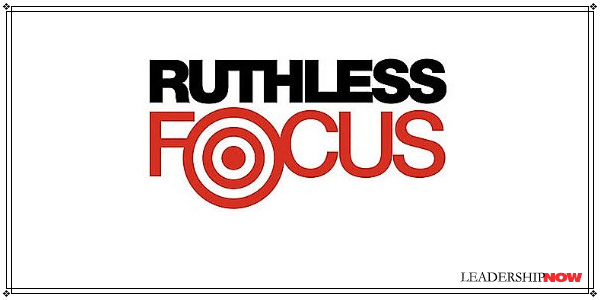 |
 |
10.18.10

Ruthless Focus
IT’S TOO EASY to get distracted. And when we do, we begin to do things we never should do. We take advantage of “opportunities” that are inconsistent with who we are, accept clients that don’t allow us to build on our strengths, hire people that don’t fit with our values, and spend more time reacting to our environment than creating it. Thomas Hall was, for most of his career, an advertising man. He has spent a lot of time helping clients grow. From accounts of great business and his own firsthand experience, he and co-author Wally Bock have extracted, in Ruthless Focus, lessons for business success based on a ruthless focus on the why—the core strategy that drives everything you do—and a ruthless focus on business basics that create the possibility for growth. A ruthless focus ensures that every action, every day, moves you and the business forward. You need a clearly defined core business strategy. The authors explain and illustrate five basic strategies to use as models in your own situation:
Your strategy should answer two questions: How are you going to beat the competition? and How are you going to make money? Once defined, that strategy needs to define all of your actions. “Your core strategy is the strategy you cluster everything else around. You use the other strategies to supplement your core focus.” As they point out and their examples illustrate, you can use many strategies, but to be successful, you need a single core strategy and focus ruthlessly on achieving it. “Your core strategy is the way to achieve long-term competitive advantage and profitability.” Ruthless focus makes good sense, but the problem is we are always tempted to try something new. There are times when game-changing technologies or market conditions necessitate a change in strategy, but not as often as you would think. “When you’ve got something that’s working well, it rarely gets better if you try to change it fundamentally. The successful companies we studied are ruthless about staying with their basic strategy until it doesn’t work for them anymore. One reason may be that they think of strategy differently than most companies.” They add: Wal-Mart, Toyota, Enterprise, and Publix have all been in business for more than 50 years with the same strategy. They’ve all been through the ups and downs in the economy. Laws and regulations have changed. Successful companies have adjusted, but the adjustments were tactical or operational, not strategic. Your core strategy—your reason for existence—rarely, if ever, changes. Keep a ruthless focus. 
Posted by Michael McKinney at 12:13 AM
|
BUILD YOUR KNOWLEDGE
 

How to Do Your Start-Up Right STRAIGHT TALK FOR START-UPS 
Grow Your Leadership Skills NEW AND UPCOMING LEADERSHIP BOOKS 
Leadership Minute BITE-SIZE CONCEPTS YOU CAN CHEW ON 
Classic Leadership Books BOOKS TO READ BEFORE YOU LEAD |